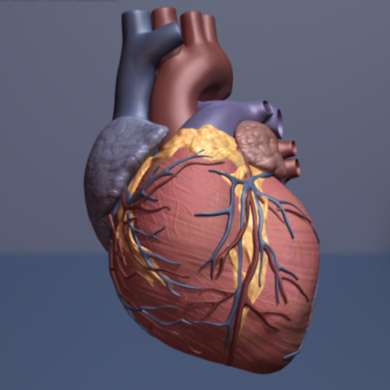Researchers discover placental stem cells that can regenerate heart after heart attack

Researchers at the Icahn School of Medicine at Mount Sinai have demonstrated that stem cells derived from the placenta known as Cdx2 cells can regenerate healthy heart cells after heart attacks in animal models. The findings, published in the May 20 issue of Proceedings of the National Academy of Sciences (PNAS), may represent a novel treatment for regenerating the heart and other organs.
"Cdx2 cells have historically been thought to only generate the placenta in early embryonic development, but never before were shown to have the ability to regenerate other organs, which is why this is so exciting. These findings may also pave the way to regenerative therapy of other organs besides the heart," said principal investigator Hina Chaudhry, MD, Director of Cardiovascular Regenerative Medicine at the Icahn School of Medicine at Mount Sinai. "They almost seem like a super-charged population of stem cells, in that they can target the site of an injury and travel directly to the injury through the circulatory system and are able to avoid rejection by the host immune system."
This team of Mount Sinai researchers had previously discovered that a mixed population of mouse placental stem cells can help the hearts of pregnant female mice recover after an injury that could otherwise lead to heart failure. In that study, they showed that the placental stem cells migrated to the mother's heart and directly to the site of the heart injury. The stem cells then programmed themselves as beating heart cells to help the repair process.
The new study was aimed at determining what type of stem cells made the heart cells regenerate. The investigators started by looking at Cdx2 cells, the most prevalent stem cell type in the previously identified mixed population, and found them to comprise the highest percentage (40 percent) of those assisting the heart from the placenta.
To test the Cdx2 cells' regenerative properties, the researchers induced heart attacks in three groups of male mice. One group received Cdx2 stem cell treatments derived from end-gestation mouse placentas, one group received placenta cells that did not express Cdx2, and the third group received a saline control. The team used magnetic resonance imaging to analyze all mice immediately after the heart attacks, and three months after induction with cells or saline. They found that every mouse in the group with Cdx2 stem cell treatments had significant improvement and regeneration of healthy tissue in the heart. By three months, the stem cells had migrated directly to the heart injury and formed new blood vessels and new cardiomyocytes (beating heart muscle cells). The mice injected with saline and the non-Cdx2 placenta cells went into heart failure and their hearts had no evidence of regeneration.
Researchers noted two other properties of the Cdx2 cells: they have all the proteins of embryonic stem cells, which are known to generate all organs of the body, but also additional proteins, giving them the ability to travel directly to the injury site, which is something embryonic stem cells cannot do, and they appear to avoid the host immune response. The immune system did not reject these cells when administered from the placenta to another animal.
"These properties are critical to the development of a human stem cell treatment strategy, which we have embarked on, as this could be a promising therapy in humans. We have been able to isolate Cdx2 cells from term human placentas also; therefore, we are now hopeful that we can design a better human stem cell treatment for the heart than we have seen in the past," explained Dr. Chaudhry. "Past strategies tested in humans were not based on stem cell types that were actually shown to form heart cells, and use of embryonic stem cells for this goal is associated with ethics and feasibility concerns. Placentas are routinely discarded around the world and thus almost a limitless source."
"These results were very surprising to us, as no other cell type tested in clinical trials of human heart disease were ever shown to become beating heart cells in petri dishes, but these did and they knew exactly where to go when we injected them into the circulation," said first author Sangeetha Vadakke-Madathil, Ph.D., postdoctoral fellow in Medicine (Cardiology) at the Icahn School of Medicine at Mount Sinai.
More information: Sangeetha Vadakke-Madathil el al., "Multipotent fetal-derived Cdx2 cells from placenta regenerate the heart," PNAS (2019). www.pnas.org/cgi/doi/10.1073/pnas.1811827116















